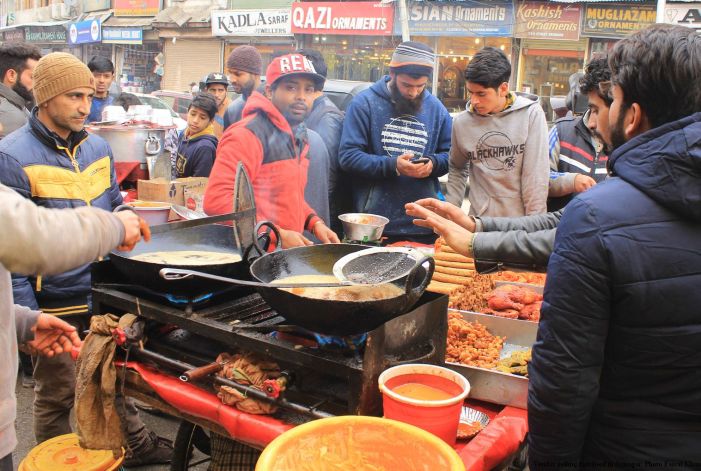
The regulation of street vending act 2014 is not extended to Jammu and Kashmir the reason is best known to the legislators, however, Minister of State for Housing & Urban Development, Ms. AsieaNaqash promised that her government will enact the ‘J&K Street Vendors (Protection of Livelihood and Regulation of Street Vending) Act, 2016’ on the pattern of ‘Street Vendors (Protection of Livelihood & Regulation of Street Vending) Act, 2014’ of Government of India in Jammu and Kashmir but people are still waiting for the implementation of the act and facing subsistence issue.
The recent case of evacuation of Street Vendors in Lal Chowk and other subareas was the result of streamlining the traffic movement done by the newly appointed IGP who is a household name due to his popularity and fame that he has earned to correct the traffic management in Jammu and Kashmir. But, when a local boy in downtown asked him a simple question on evacuation of street vendors that “you can evacuate the street vendors who have occupied the pedestrian space, but please evacuate the bunker which has completely occupied the one side of the traffic road” he had no answer to this question but on his insistence and order municipality with the help of local police evacuated the street vendors in an unjustifiable manner.
In the absence of a policy, vendors are being harassed by police and municipal officials. Street vendors are often asked to cough up a bribe for operational ease and to avoid harassment from government authorities.
Since Kashmir is a disputed area where hartals are daily affairs and observed more than two or three times in a week which cripples the entire society and hampers the livelihood of those who are living hand to mouth. The bus drivers, street vendors, auto drivers and those who are dependent on manual work are mostly affected due to restrictions in such a situation it is unwise to prohibit vendors to not stall their makeshift vending machines or road carts so that they could earn a decent living sufficient for the upcoming week.
Street vendors are often those who are unable to get regular jobs in the remunerative formal sector on account of their low level of education and skills. They try to solve their livelihood issues through their meagre financial resources and sweat equity in a harassment-free atmosphere.
The recent episode where street vendors were seen jumping over the bridge to commit suicide out of frustration as a state was not allowing them to install the makeshifts and earn the livelihood. The reaction of the suicidal act was observed on social networking sites, many people called it a drama on behalf of street vendors who according to them are running a mafia which is an untrue story. These vendors have existential crises, those journalists and researchers must visit their homes and do a proper research in order to understand what conditions they live. What would be the future of their children? Who are not able to earn two-time meal cannot educate their children? What is the alternative in case government plans to evacuate them from the unauthorized locations?
The implementation of the Street Vendors Act can give a sigh of relief to these vendors who are struggling to meet two ends. If this act will be enacted in Jammu and Kashmir it will make the town vending committee the key authority in determining the rights of a hawker. The committee shall conduct a survey and identify street vendors and issue certificates or licences and nobody will be allowed to do business on a pavement without this certificate.
The act of 2014 which is implemented across India gives the proper right to every citizen to move freely and use the roads without any impediments. The provision of space or area for street vending takes into account the civic facilities for the appropriate use of identified spaces or areas as vending zones.
This act which AiseaNaqash promised to implement in Jammu and Kashmir includes earmarking space for vending zones categorised into three segments – restriction-free-vending zones, restricted vending zones and no-vending zones.
According to section 4 of the Act, every street vendor identified as per the provisions of the Act will get a certificate of vending. This vending certificate gives the informal vendor an identity in the city for meeting his basic subsistence needs. It is also a representation of her/his citizenship and is a way forward for the information to be inclusively accommodated in the urban landscape. The identity certificates also bring a bundle of rights with them, which were previously considered as abstract privileges. This act will resolve many issues and people will come to know where to buy goods from these vendors whose spaces will be allocated as per the survey and policy framed by the state government of Jammu and Kashmir. And help the society to eliminate the mafia of municipality authorities including police who are seen involved in the confiscation of their goods for a long duration, discriminate fines and physical violence against street vendors (in some cases).
Altaf Bashir is a South Asia Association for Regional Cooperation Fellow, he has recently completed his Master’s In International Relations Major’s In Peace and Conflict Studies.











































